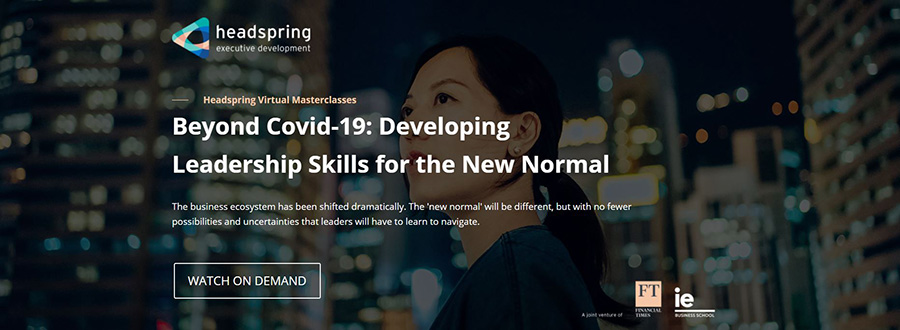Why purposeful leadership today will deliver results tomorrow
Ronald Reagan once famously declared the scariest sentence in the English language is “government is here to help people”. Four decades later, this statement rings hollow. As the world faces economic and social upheaval, we find ourselves fundamentally reappraising the role and purpose of government.
Over the past few months, countries have scrambled to provide their citizens with medical and protective equipment for the COVID-19 virus. Governments have simultaneously provided businesses with unprecedented levels of financial support, challenging long-held views about free-market capitalism.
Moreover, the previous rhetoric about the status and affordability of public services is changing. Often portrayed as a liability, public services have proven during this crisis how essential they are to our society. Therefore, any future business paradigm must address the value of their contribution.
But, how far will the pendulum of change swing? And how do businesses and corporate leaders need to respond?

To discuss this and the shape of the future workplace, we spoke to Michael Skapinker, Headspring Executive Editor and Associate Editor at the Financial Times and Adam Kingl, management advisor, speaker and author of Next Generation Leadership.
Self-sufficiency vs globalism
Over the last decade, there’s been a growing demonstration of anti-globalist sentiment. From the election of populist leaders, for example, in the USA, Brazil and Hungary to the Brexit referendum in the UK, countries are increasingly looking inwards as a form of self-protection.
The 2008 financial crisis and now the COVID pandemic have further pushed governments into a state of self-sufficiency leading to significant breakdowns in old partnerships and unions.
Whether it’s countries trying to negotiate and divert medical supplies to themselves, or disagreements over financial contributions, such as the battle between Italy with the Netherlands over Corona bonds, governments are prioritising actions that benefit their citizens.
At an organisational level, there seems to be more collaboration. For instance, scientists from the USA, UK, China and Israel are working together, sharing knowledge to find a vaccine. However, at some point, there will be a need to return to international trade and international travel, and this will undoubtedly require international cooperation.
As Mike Skapinker pointedly observes, “on the one hand you’re craving self-sufficiency both as a corporate, as a government and as individuals. While at the same time we’re looking at how we solve these things when the next crisis comes around alongside recognising the need for greater international cooperation”.
WFH—economic panacea or passing trend

Before the crisis, digital literacy varied widely across businesses, with many organisations adhering to an entrenched assumption that physical presence equals productivity.
In particular, older generations have traditionally steered clear of endorsing work from home policies. In many company cultures requests for flexible working are interpreted to mean laziness and work-shyness. However, for younger generations, like the Millennials who are digital natives, working online is normal.
Now that so many of us are moving into this digital sphere, it seems the discord about work-life balance or virtual working between the generations could start to disappear, paving the way for more compromise.
Do we need a new kind of social contract between business and society to reflect these new relationships?
Of course, this isn’t the end of the debate. Some activities lend themselves perfectly to working from home, such as brainstorming and sharing ideas. On the other hand, working from home requires trust and giving your employees agency to do their work: something that leaders and managers will need to learn if this new way of working is to continue past the crisis.
When we talk about the benefits of working virtually during the crisis, we can’t omit the vast swathe of public sector workers who are unable to do this. What this crisis has put in stark relief is that without our critical workers—the nurses, the hospital cleaners, bus drivers and the waste collection workers—neither society nor businesses can function.
As a result, the challenge to both governments and the private sector will be how they reappraise the value attached to these types of work. Moreover, do we need a new kind of social contract between business and society to reflect these new relationships?
The stigma of executive pay post COVID

For a long time, scandal and controversy have gone hand in hand with discussions about CEO salaries. With many staff currently placed on furlough, and businesses seeking government bailouts, many executives have responded by taking cuts in their pay.
Clearly, during a crisis, the decision to argue for more pay would risk embarrassment and long-standing reputational damage.
As we emerge on the other side of the pandemic, can we expect to see a longer-term shift in how much CEOs get paid? The fact is, most executive pay is driven mainly by market forces, so it will take a while for any shift to occur.
However, many customers and employees are going to expect a much stronger sense of triple bottom line and a greater onus on businesses and their leaders to demonstrate how they serve both their stakeholders and the broader community.
Can we expect to see a longer-term shift in how much CEOs get paid?
Post COVID we can expect growing demands for justification of how business leaders are valued and rewarded financially.
These expectations raise questions about the measurability of performance. Trying to attribute good or bad performance to leaders has always been a complicated and challenging task. Measuring the outputs of a doctor, a nurse, or a food delivery driver is far simpler than, let’s say, a knowledge worker at a very senior level.
Does this mean firms will need entirely new performance evaluation frameworks in the future, systems that will include all stakeholders in the process?
The leadership of the future needs to care
Following previous economic crises, organisations have reacted either by retreating to what they know or innovating. It’s no different now. As we face up to a new normal, leaders are encouraged to look at their business models to assess financial and conceptual relevance.
This is a tough task, yes, but this is a perfect time to ask challenging and provocative questions about your mission statement, your operating model, and your understanding of your customers.
Empathy becomes critical, not merely in telling people that they are doing a good job, but genuinely trying to understand what they are experiencing.
Of course, resilience is paramount. As Adam explains,
“We have to think about organisational resilience, which is not just about morale but how we hold each other together. I think this is not only the responsibility of the HR department but also the CEO”.
Empathy becomes critical, not merely in telling people that they are doing a good job, but genuinely trying to understand what they are experiencing during such difficult times. Besides, leaders can no longer avoid telling the truth. In other words, no sugar coating the hard facts. People need to know: Is my job safe? Does the company have a future? Will I be paid?
Final thoughts
At present, no one can accurately predict how long this virus will last, its longer-term impact, or if there will be others like it in the near future.
One thing is clear, though: as we emerge on the other side, businesses will need to explain and justify their choices and behaviours during this crisis.
Did they step up to the plate and support the health and well-being of their people, their customers and communities? Or did they focus solely on securing commercial gains?
Because, how executives lead their companies during the pandemic, is going to go a long way in signifying who they are, what they value and how they will operate in future. Only by setting a positive example can leaders secure their survival for the foreseeable future.
For the full discussion between Michael and Alan with key insights and advice for leaders, watch our Virtual Masterclass: Developing Leadership Skills for the New Normal
